Winning the loser's game
Re: Winning the loser's game
Researchers in finance, whether practitioners or academics, need to realize that they will find seemingly successful trading strategies by chance. We can no longer use the traditional tools of statistical analysis that assume that no one has looked at the data before and there is only a single strategy tried. A multiple-testing framework offers help in reducing the number of false strategies adapted by firms. Two sigma is no longer an appropriate benchmark for evaluating trading strategies.
http://www.iijournals.com/doi/full/10.3 ... .40.5.108#
http://www.iijournals.com/doi/full/10.3 ... .40.5.108#
Remember the Golden Rule: Those who have the gold make the rules.
***
"A soberania e o respeito de Portugal impõem que neste lugar se erga um Forte, e isso é obra e serviço dos homens de El-Rei nosso senhor e, como tal, por mais duro, por mais difícil e por mais trabalhoso que isso dê, (...) é serviço de Portugal. E tem que se cumprir."
***
"A soberania e o respeito de Portugal impõem que neste lugar se erga um Forte, e isso é obra e serviço dos homens de El-Rei nosso senhor e, como tal, por mais duro, por mais difícil e por mais trabalhoso que isso dê, (...) é serviço de Portugal. E tem que se cumprir."
Re: Winning the loser's game
Remember the Golden Rule: Those who have the gold make the rules.
***
"A soberania e o respeito de Portugal impõem que neste lugar se erga um Forte, e isso é obra e serviço dos homens de El-Rei nosso senhor e, como tal, por mais duro, por mais difícil e por mais trabalhoso que isso dê, (...) é serviço de Portugal. E tem que se cumprir."
***
"A soberania e o respeito de Portugal impõem que neste lugar se erga um Forte, e isso é obra e serviço dos homens de El-Rei nosso senhor e, como tal, por mais duro, por mais difícil e por mais trabalhoso que isso dê, (...) é serviço de Portugal. E tem que se cumprir."
Re: Winning the loser's game

if your investment horizon occurred over a largely trend-driven period (e.g. late 1970s through 2000), rebalancing hurt you. As equities ran, you would have wanted to overweight them: rebalancing kept them on a leash. From 1975-2000, rebalancing may have actually cost you 100bps a year. Note 1975-2000 was one of the best post-inflation return periods, with inflation-adjusted returns for a 50/50 portfolio eclipsing 7%. $10,000 invested in 12/1975 in a 50/50 and rebalanced every year would have come $60,868. Not bad – but not the $70,134 you could have ended up with if you hadn't rebalanced.
On the other hand, if you weren't lucky enough to invest from 1975 - 2000, and your investment period contained a largely mean-reversionary period – like 2000-2010 in U.S. equities were – then rebalancing would add value as you sold at highs and bought at lows.
Ou seja: se torturarmos suficientemente os dados eles acabam por dar as respostas que queremos ouvir.
Mesmo com as entradas e saídas escolhidas a dedo, neste exemplo, o SD e o MDD são inferiores na opção rebalanceamento.
É preciso uma paciência...

Remember the Golden Rule: Those who have the gold make the rules.
***
"A soberania e o respeito de Portugal impõem que neste lugar se erga um Forte, e isso é obra e serviço dos homens de El-Rei nosso senhor e, como tal, por mais duro, por mais difícil e por mais trabalhoso que isso dê, (...) é serviço de Portugal. E tem que se cumprir."
***
"A soberania e o respeito de Portugal impõem que neste lugar se erga um Forte, e isso é obra e serviço dos homens de El-Rei nosso senhor e, como tal, por mais duro, por mais difícil e por mais trabalhoso que isso dê, (...) é serviço de Portugal. E tem que se cumprir."
Re: Winning the loser's game
VirtuaGod Escreveu:LTCM Escreveu:No link abaixo está o yearbook do Credit Suisse publicação que vale a pena ler
+1
Ainda não li a deste ano, mas está na lista
+2

As opiniões expressas baseiam-se essencialmente em análise fundamental, e na relação entre o valor de mercado dos ativos e as suas perspectivas futuras de negocio, como tal traduzem uma interpretação pessoal da realidade,devendo como tal apenas serem consideradas como uma perspetiva meramente informativa sobre os ativos em questão, não se constituindo como sugestões firmes de investimento
Re: Winning the loser's game

Remember the Golden Rule: Those who have the gold make the rules.
***
"A soberania e o respeito de Portugal impõem que neste lugar se erga um Forte, e isso é obra e serviço dos homens de El-Rei nosso senhor e, como tal, por mais duro, por mais difícil e por mais trabalhoso que isso dê, (...) é serviço de Portugal. E tem que se cumprir."
***
"A soberania e o respeito de Portugal impõem que neste lugar se erga um Forte, e isso é obra e serviço dos homens de El-Rei nosso senhor e, como tal, por mais duro, por mais difícil e por mais trabalhoso que isso dê, (...) é serviço de Portugal. E tem que se cumprir."
Re: Winning the loser's game
LTCM Escreveu:No link abaixo está o yearbook do Credit Suisse publicação que vale a pena ler
+1
Ainda não li a deste ano, mas está na lista
Artigos e estudos: Página repositório dos meus estudos e análises que vou fazendo. Regularmente actualizada. É costume pelo menos mais um estudo por semana. Inclui a análise e acompanhamento das carteiras 4 e 8Fundos.
Portfolio Analyser: Ferramenta para backtests de Fundos e ETFs Europeus
"We don’t need a crystal ball to be successful investors. However, investing as if you have one is almost guaranteed to lead to sub-par results." The Irrelevant Investor
Portfolio Analyser: Ferramenta para backtests de Fundos e ETFs Europeus
"We don’t need a crystal ball to be successful investors. However, investing as if you have one is almost guaranteed to lead to sub-par results." The Irrelevant Investor
Re: Winning the loser's game
No link abaixo está o yearbook do Credit Suisse publicação que vale a pena ler; mesmo para quem não coloca o dinheiro numa estratégia vencedora (investimento passivo).
http://publications.credit-suisse.com/t ... 09CFE37CCB
(Até Portugal lá aparece - o passos é mesmo um génio)
http://publications.credit-suisse.com/t ... 09CFE37CCB
(Até Portugal lá aparece - o passos é mesmo um génio)
Remember the Golden Rule: Those who have the gold make the rules.
***
"A soberania e o respeito de Portugal impõem que neste lugar se erga um Forte, e isso é obra e serviço dos homens de El-Rei nosso senhor e, como tal, por mais duro, por mais difícil e por mais trabalhoso que isso dê, (...) é serviço de Portugal. E tem que se cumprir."
***
"A soberania e o respeito de Portugal impõem que neste lugar se erga um Forte, e isso é obra e serviço dos homens de El-Rei nosso senhor e, como tal, por mais duro, por mais difícil e por mais trabalhoso que isso dê, (...) é serviço de Portugal. E tem que se cumprir."
Re: Winning the loser's game
Remember the Golden Rule: Those who have the gold make the rules.
***
"A soberania e o respeito de Portugal impõem que neste lugar se erga um Forte, e isso é obra e serviço dos homens de El-Rei nosso senhor e, como tal, por mais duro, por mais difícil e por mais trabalhoso que isso dê, (...) é serviço de Portugal. E tem que se cumprir."
***
"A soberania e o respeito de Portugal impõem que neste lugar se erga um Forte, e isso é obra e serviço dos homens de El-Rei nosso senhor e, como tal, por mais duro, por mais difícil e por mais trabalhoso que isso dê, (...) é serviço de Portugal. E tem que se cumprir."
Re: Winning the loser's game

Remember the Golden Rule: Those who have the gold make the rules.
***
"A soberania e o respeito de Portugal impõem que neste lugar se erga um Forte, e isso é obra e serviço dos homens de El-Rei nosso senhor e, como tal, por mais duro, por mais difícil e por mais trabalhoso que isso dê, (...) é serviço de Portugal. E tem que se cumprir."
***
"A soberania e o respeito de Portugal impõem que neste lugar se erga um Forte, e isso é obra e serviço dos homens de El-Rei nosso senhor e, como tal, por mais duro, por mais difícil e por mais trabalhoso que isso dê, (...) é serviço de Portugal. E tem que se cumprir."
Re: Winning the loser's game
We have set up a simple three-factor model in which we regress the performance data for U.S. large cap managers against the contemporaneous rolling 12-month returns of each factor.
Using the results of this regression, we can estimate the percentage of managers that would be expected to outperform at each point in time given only the relative performance of our three factors. The predicted and actual data are overlayed in Exhibit 6. The conclusion to be drawn is that a very large proportion of the historical variability of large cap managers’ ability to add alpha is explained by our simple three-factor out-of-benchmark model

GMO’s point here is to say don’t throw out active management just because of one bad year, one where those three factors gave most stock pickers a significant handicap.
Some might draw a different conclusion. If non-stock picking factors are behind the collective performance of stock pickers, then the point of them is what, exactly? Note too the analysis of under and over performance in this instance is before fees are deducted.
So we would agree, don’t judge active management by one year. Judge the industry by its long term failure to justify the fees and, if you can, stop paying them.
Using the results of this regression, we can estimate the percentage of managers that would be expected to outperform at each point in time given only the relative performance of our three factors. The predicted and actual data are overlayed in Exhibit 6. The conclusion to be drawn is that a very large proportion of the historical variability of large cap managers’ ability to add alpha is explained by our simple three-factor out-of-benchmark model

GMO’s point here is to say don’t throw out active management just because of one bad year, one where those three factors gave most stock pickers a significant handicap.
Some might draw a different conclusion. If non-stock picking factors are behind the collective performance of stock pickers, then the point of them is what, exactly? Note too the analysis of under and over performance in this instance is before fees are deducted.
So we would agree, don’t judge active management by one year. Judge the industry by its long term failure to justify the fees and, if you can, stop paying them.
Remember the Golden Rule: Those who have the gold make the rules.
***
"A soberania e o respeito de Portugal impõem que neste lugar se erga um Forte, e isso é obra e serviço dos homens de El-Rei nosso senhor e, como tal, por mais duro, por mais difícil e por mais trabalhoso que isso dê, (...) é serviço de Portugal. E tem que se cumprir."
***
"A soberania e o respeito de Portugal impõem que neste lugar se erga um Forte, e isso é obra e serviço dos homens de El-Rei nosso senhor e, como tal, por mais duro, por mais difícil e por mais trabalhoso que isso dê, (...) é serviço de Portugal. E tem que se cumprir."
Paul Wilmot
Remember the Golden Rule: Those who have the gold make the rules.
***
"A soberania e o respeito de Portugal impõem que neste lugar se erga um Forte, e isso é obra e serviço dos homens de El-Rei nosso senhor e, como tal, por mais duro, por mais difícil e por mais trabalhoso que isso dê, (...) é serviço de Portugal. E tem que se cumprir."
***
"A soberania e o respeito de Portugal impõem que neste lugar se erga um Forte, e isso é obra e serviço dos homens de El-Rei nosso senhor e, como tal, por mais duro, por mais difícil e por mais trabalhoso que isso dê, (...) é serviço de Portugal. E tem que se cumprir."
Re: Winning the loser's game
Don't get distracted by geopolitical issues. We're likely to see more geopolitical crises ahead, so it's important to recognize that they usually don't impact fundamentals, particularly over the longer term. Investors need to assess whether a crisis passes that litmus test and then act accordingly.
Don't let emotions alter allocations. For investors with long time horizons, the kind of exodus from equity mutual funds that we've seen multiple times in the past few years can hurt their chances of meeting their goals. Morningstar data reveals what I call the “investor psychology gap” or the disparity between mutual fund returns and investor returns. The typical investor gained 4.8% annualized over the 10 years ended Dec. 31, 2013 versus 7.3% for the typical fund. That's partially due to investors jumping in and out of the stock market. Despite the turbulence, investors need to be mindful of the perils of market timing and develop a long-term plan—and then stick with it.
Specifically, Allianz Global Investors looked at the performance of the Datastream US Total Market Total Return Index from 1973 through the end of 2013, comparing four different investment approaches:
1. Investing $100 at the start of the first year and adding an additional $100 at the start of each subsequent year.
2. Investing $100 on the day of the lowest index level of the year and adding an additional $100 each year on the day of the lowest index level of that year—the best day of the year to invest.
3. Investing $100 on the day of the highest index level of the year and adding an additional $100 each year on the day of the highest index level of that year—the worst day of the year to invest.
4. Investing $100 each year at the start of the year as in the first approach, but assuming one misses the returns of the best three trading days in each year.

The result? The returns are actually quite similar for the first three approaches. The first approach yields an annualized return (adjusting for all the $100 injections) of 11.6% while the second approach yields an annualized return of 11.9%. The third approach produces an annualized return of 11%. While these approaches are all within striking distance of each other, the hypothetical fourth approach produces dramatically lower performance: an annualized return of just 1%.
Don't let emotions alter allocations. For investors with long time horizons, the kind of exodus from equity mutual funds that we've seen multiple times in the past few years can hurt their chances of meeting their goals. Morningstar data reveals what I call the “investor psychology gap” or the disparity between mutual fund returns and investor returns. The typical investor gained 4.8% annualized over the 10 years ended Dec. 31, 2013 versus 7.3% for the typical fund. That's partially due to investors jumping in and out of the stock market. Despite the turbulence, investors need to be mindful of the perils of market timing and develop a long-term plan—and then stick with it.
Specifically, Allianz Global Investors looked at the performance of the Datastream US Total Market Total Return Index from 1973 through the end of 2013, comparing four different investment approaches:
1. Investing $100 at the start of the first year and adding an additional $100 at the start of each subsequent year.
2. Investing $100 on the day of the lowest index level of the year and adding an additional $100 each year on the day of the lowest index level of that year—the best day of the year to invest.
3. Investing $100 on the day of the highest index level of the year and adding an additional $100 each year on the day of the highest index level of that year—the worst day of the year to invest.
4. Investing $100 each year at the start of the year as in the first approach, but assuming one misses the returns of the best three trading days in each year.

The result? The returns are actually quite similar for the first three approaches. The first approach yields an annualized return (adjusting for all the $100 injections) of 11.6% while the second approach yields an annualized return of 11.9%. The third approach produces an annualized return of 11%. While these approaches are all within striking distance of each other, the hypothetical fourth approach produces dramatically lower performance: an annualized return of just 1%.
Remember the Golden Rule: Those who have the gold make the rules.
***
"A soberania e o respeito de Portugal impõem que neste lugar se erga um Forte, e isso é obra e serviço dos homens de El-Rei nosso senhor e, como tal, por mais duro, por mais difícil e por mais trabalhoso que isso dê, (...) é serviço de Portugal. E tem que se cumprir."
***
"A soberania e o respeito de Portugal impõem que neste lugar se erga um Forte, e isso é obra e serviço dos homens de El-Rei nosso senhor e, como tal, por mais duro, por mais difícil e por mais trabalhoso que isso dê, (...) é serviço de Portugal. E tem que se cumprir."
Re: Winning the loser's game
Mouro_Emprestado Escreveu:O risco é o mesmo.
A cotação do ouro é normalmente denominada em dollares. Se tens um ETF em USD e se num mês a cotação em dollares do ouro não varia, o ETF também não deverá variar. Agora supõe que o Euro desvalorizou 10%. Neste caso, tinhas tido uma valorização de 10% desse ETF quando o convertesses para euros.
Alternativamente, tinhas um ETF em euros que segue o preço do ouro mas em euros. Nesse mesmo mês, esse teria uma valorização de 10%, pelo que o teu ETF teria igualmente uma valorização nessa percentagem.
No final do dia, a diferença entre ambos os cenários seria zero.
Para ilustrar ainda melhor este ponto, veja o gráfico neste link: https://www.justetf.com/ch-en/find-etf.html?index=Gold&tab=comparison&assetClass=class-preciousMetals"eCurrency=EUR
São vários ETFs de ouro, cotados em diferentes moedas (USD, EUR, CHF, GBP). São todos linhas coincidentes quando expressas numa mesma moeda. Ou seja, é indiferente qual a moeda da cotação.
Re: Winning the loser's game
The Case for Actively Managed Funds
There Are Still Some Scenarios Where the Hands-On Way Might Make More Sense
WSJ
There Are Still Some Scenarios Where the Hands-On Way Might Make More Sense
WSJ
Remember the Golden Rule: Those who have the gold make the rules.
***
"A soberania e o respeito de Portugal impõem que neste lugar se erga um Forte, e isso é obra e serviço dos homens de El-Rei nosso senhor e, como tal, por mais duro, por mais difícil e por mais trabalhoso que isso dê, (...) é serviço de Portugal. E tem que se cumprir."
***
"A soberania e o respeito de Portugal impõem que neste lugar se erga um Forte, e isso é obra e serviço dos homens de El-Rei nosso senhor e, como tal, por mais duro, por mais difícil e por mais trabalhoso que isso dê, (...) é serviço de Portugal. E tem que se cumprir."
Re: Winning the loser's game
Remember the Golden Rule: Those who have the gold make the rules.
***
"A soberania e o respeito de Portugal impõem que neste lugar se erga um Forte, e isso é obra e serviço dos homens de El-Rei nosso senhor e, como tal, por mais duro, por mais difícil e por mais trabalhoso que isso dê, (...) é serviço de Portugal. E tem que se cumprir."
***
"A soberania e o respeito de Portugal impõem que neste lugar se erga um Forte, e isso é obra e serviço dos homens de El-Rei nosso senhor e, como tal, por mais duro, por mais difícil e por mais trabalhoso que isso dê, (...) é serviço de Portugal. E tem que se cumprir."
Re: Winning the loser's game
mushis Escreveu:certo acerca do GEUR
em relação a ETFs cotados em USD, é feita uma conversão da nossa moeda para USD. como o EUR tá baixo, vou comprar menos quantidade do que quando o euro estava estável a valer entre 1,27-1,37 USD.
é o risco cambial que se tanto se fala por aqui. correto?
Daí estar a considerar comprar um ETF cotado em EURO. De ouro.
O risco é o mesmo.
A cotação do ouro é normalmente denominada em dollares. Se tens um ETF em USD e se num mês a cotação em dollares do ouro não varia, o ETF também não deverá variar. Agora supõe que o Euro desvalorizou 10%. Neste caso, tinhas tido uma valorização de 10% desse ETF quando o convertesses para euros.
Alternativamente, tinhas um ETF em euros que segue o preço do ouro mas em euros. Nesse mesmo mês, esse teria uma valorização de 10%, pelo que o teu ETF teria igualmente uma valorização nessa percentagem.
No final do dia, a diferença entre ambos os cenários seria zero.
- Mensagens: 379
- Registado: 13/9/2013 0:16
Re: Winning the loser's game
certo acerca do GEUR
em relação a ETFs cotados em USD, é feita uma conversão da nossa moeda para USD. como o EUR tá baixo, vou comprar menos quantidade do que quando o euro estava estável a valer entre 1,27-1,37 USD.
é o risco cambial que se tanto se fala por aqui. correto?
Daí estar a considerar comprar um ETF cotado em EURO. De ouro.
em relação a ETFs cotados em USD, é feita uma conversão da nossa moeda para USD. como o EUR tá baixo, vou comprar menos quantidade do que quando o euro estava estável a valer entre 1,27-1,37 USD.
é o risco cambial que se tanto se fala por aqui. correto?
Daí estar a considerar comprar um ETF cotado em EURO. De ouro.
- Mensagens: 39
- Registado: 30/3/2011 17:37
- Localização: 14
Re: Winning the loser's game
mushis Escreveu:Com o Euro tão fraco face ao USD, questiono uma lista de ETF interessantes cotados em euro.
procuro ouro, e já vi o GEUR...
obg
Não é por um ETF estar cotado em EUR ou USD que vai fazer grande diferença. O que pode fazer diferença é a região geográfica onde se investe e se há ou não proteção cambial. Por exemplo, um ETF cotado em USD sobre ações europeias sem hedging cambial vai dar quase ao mesmo do que um ETF em EUR. Só estivesse em USD e com hedging cambial é que teria uma performance bastante diferente.
Em relação ao ouro, todos os ETFs que encontro estão cotados em USD. Esse que mencionou, o GEUR, não é um simples ETF sobre o ouro. Tem lá mais uma série de artimanhas com futuros de moedas, estando short em EUR, ou seja, aposta na queda do EUR.
Re: Winning the loser's game
Com o Euro tão fraco face ao USD, questiono uma lista de ETF interessantes cotados em euro.
procuro ouro, e já vi o GEUR...
obg
procuro ouro, e já vi o GEUR...
obg
- Mensagens: 39
- Registado: 30/3/2011 17:37
- Localização: 14
Re: Winning the loser's game
O próprio Buffett que recomenda um lazy-portfolio aos seus herdeiros, apostando 90% num fundo índice que segue o SP500 e 10% em obrigações US de curto prazo.
Warren Buffett to heirs: Put my estate in index funds
Warren Buffett to heirs: Put my estate in index funds
- Mensagens: 379
- Registado: 13/9/2013 0:16
Re: Winning the loser's game
The S&P 500 hit record highs in 2014, but Wall Street’s best and brightest mutual fund managers fell short and failed to keep pace, costing investors billions in missing gains—and fees. Passive funds that mirror popular indexes outpaced more expensive actively managed funds for the year.
Last year was nothing new. Actively managed funds are in the midst of a long losing streak that began in 2008. Not surprisingly, investment dollars are flowing strongly into passive funds.
Daqui se retira que:
O investidor não preguiçoso e com conhecimentos acima da média sobre o funcionamento dos mercados, tem piores resultados do que aqueles que simplificam e se deixam de adivinhações.
As ideias de pessoas preguiçosas e que tenham uma certa incompetência teórica são na prática, rentabilidade da carteira, superiores às dos sabições que acertam no totobola à segunda-feira (e mesmo assim nem sempre).
Na verdade isto faz lembrar aquela história do investidor sempre atento às correções mais acentuadas e a sair delas o mais cedo possível e depois também a reentrar o mais cedo possível depois de passar a tempestade sem capacidade de perceber que é um néscio que só se engana a ele próprio.
Remember the Golden Rule: Those who have the gold make the rules.
***
"A soberania e o respeito de Portugal impõem que neste lugar se erga um Forte, e isso é obra e serviço dos homens de El-Rei nosso senhor e, como tal, por mais duro, por mais difícil e por mais trabalhoso que isso dê, (...) é serviço de Portugal. E tem que se cumprir."
***
"A soberania e o respeito de Portugal impõem que neste lugar se erga um Forte, e isso é obra e serviço dos homens de El-Rei nosso senhor e, como tal, por mais duro, por mais difícil e por mais trabalhoso que isso dê, (...) é serviço de Portugal. E tem que se cumprir."
Re: Winning the loser's game
Boas Pessoal,
Ninguem tem este tópico completo em pdf, antes de alguns posts serem apagados?
Queria tantooo ...
Desculpem o repost.
Abraço
Ninguem tem este tópico completo em pdf, antes de alguns posts serem apagados?
Queria tantooo ...
Desculpem o repost.
Abraço
Re: Winning the loser's game
Cem pt Escreveu:Fui espreitar as performances sugeridas no “Permanent Portfolio” do Harry Browne.
Os retornos nos últimos 8 anos variaram entre os +14% aos -2%, com uma média ligeiramente abaixo dos +8% e com um desvio-padrão desses mesmos valores a rondar os 6%.
Não consegui encontrar nada em relação aos “drawdowns”, não sei se foi nabice minha na pesquisa ou se só estão acessíveis a clientes com acesso a dados mais restritos.
No caso de uma possível versão europeia do Portfolio Permanente do Harry Browne (que é bastante mais recente que a versão Americana, pelo simples facto que os ETFs com fees de gestão baixos são relativamente recentes), obtive os seguintes retornos desde 1 de Julho de 2007:
Ganhos/Perdas (%)
2007 (Jul-Dec) 2,92
2008 -3,31
2009 12,58
2010 15,30
2011 3,87
2012 9,21
2013 -2,94
2014 16,30
Podes analisar melhor no seguinte post: viewtopic.php?f=3&t=76243&start=1575#p1165471
- Mensagens: 379
- Registado: 13/9/2013 0:16
Re: Winning the loser's game
Remember the Golden Rule: Those who have the gold make the rules.
***
"A soberania e o respeito de Portugal impõem que neste lugar se erga um Forte, e isso é obra e serviço dos homens de El-Rei nosso senhor e, como tal, por mais duro, por mais difícil e por mais trabalhoso que isso dê, (...) é serviço de Portugal. E tem que se cumprir."
***
"A soberania e o respeito de Portugal impõem que neste lugar se erga um Forte, e isso é obra e serviço dos homens de El-Rei nosso senhor e, como tal, por mais duro, por mais difícil e por mais trabalhoso que isso dê, (...) é serviço de Portugal. E tem que se cumprir."
active share
Remember the Golden Rule: Those who have the gold make the rules.
***
"A soberania e o respeito de Portugal impõem que neste lugar se erga um Forte, e isso é obra e serviço dos homens de El-Rei nosso senhor e, como tal, por mais duro, por mais difícil e por mais trabalhoso que isso dê, (...) é serviço de Portugal. E tem que se cumprir."
***
"A soberania e o respeito de Portugal impõem que neste lugar se erga um Forte, e isso é obra e serviço dos homens de El-Rei nosso senhor e, como tal, por mais duro, por mais difícil e por mais trabalhoso que isso dê, (...) é serviço de Portugal. E tem que se cumprir."



 Trocos por miúdos - blog sobre poupanças e finanças
Trocos por miúdos - blog sobre poupanças e finanças
